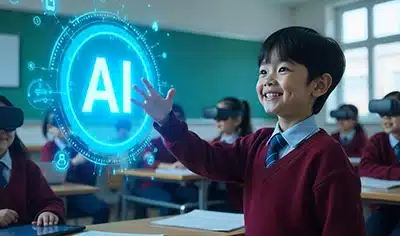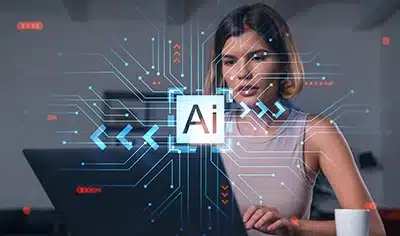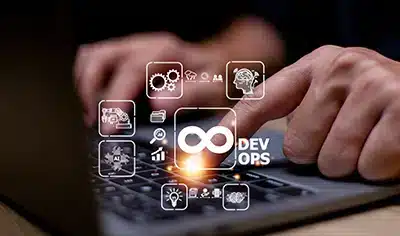Hospitality has always gained from efficiency and personal touch. But today hotel owners must balance these elements with latest innovations. Addressing complex guest expectations requires deployment of AI in the hospitality industry. This helps to create various operational efficiencies. The use of AI in front and back-office operations also creates personal experiences for guests.

The hospitality industry is focused on AI’s potential to grow operational efficiency and guest satisfaction. A recent PwC research on major hospitality companies states that 70% of hotel leaders plan to automate businesses to boost staff efficiency. Similarly, as per one Deloitte survey, 52% of respondents believe Gen AI will handle customer interactions and 44% expect it will play a role in guest engagement.
Table of Contents
Relevance of AI in Hospitality Industry
Impact of AI on Hotel Management and Guest Interactions
- Chatbots and Virtual Assistants Powered by AI
- AI-Powered Customized Visitor Experiences
- AI-Powered Smart Rooms and Contactless Check-ins
AI-Based Operational Efficiencies
- AI Driven Revenue Management
- Automation of Housekeeping and Maintenance
- AI-Powered Food and Beverage Management
How to Step Up AI Adoption in Hospitality
Relevance of AI in Hospitality Industry
Several factors are driving the growth of AI in hospitality industry:
- Need to offer unique experiences
- Staff shortages and poor management practices
- Need for zero-contact services
- Reduced costs without compromising service quality
- Better use of data to predict and respond to customer needs
AI is used in many ways in the hospitality industry. Intelligent chatbots /AI assistants, automated housekeeping schedules, and revenue management are few examples.
Smart hotel design can create better guest experiences. It can also enhance front-desk operations. Access to smart mirrors, AI-controlled room settings, and automated record of guest preferences reflect the new standards of hospitality.
Impact of AI on Hotel Management and Guest Interactions
Today travellers ask for personalized services even before arriving in hotels. AI in the hospitality industry delivers data-based insights in real-time to match visitor needs efficiently.
1. Chatbots and Virtual Assistants Powered by AI
Two well-known applications of AI in the hotel industry are chatbots and virtual assistants. These digital assistants allow guests to book a room. They can also order room service and expect round-the-clock support. AI assistants handle multiple queries simultaneously. Unlike humans, they need no rest and can work non-stop. Being always available, they can close queries faster and increase guest satisfaction.
International hotels like Hilton and Marriott have been using AI chatbots for interacting with guests during their stay and even after. These chatbots allow guests to smoothly check-in and get personal recommendations round the clock. AI-based messaging apps also offer guests many entertainment options and quick room service to enhance their stay.
2. AI-Powered Customized Visitor Experiences
In hospitality sector, personalization is becoming a norm. AI is making things better every day. Today, AI systems can tailor guest experiences by analyzing past bookings, and visitor preferences.
AI apps automatically know preferences of repeat guests upon arrival for things like temperature and food choices. Thanks to AI, predictive personalization is now a reality for several hotels.
AI-based systems offer recommendations for itineraries and dining venues. They also remember their guest’s preferred in-room music and lighting choices. Such guest experiences create higher satisfaction and customer loyalty.
The Wynn Las Vegas hotel uses Amazon Echo with Alexa chatbot in every room. This gives guests full control over their room environment using their voice.
The latest AI-based agents also integrate with hotel’s loyalty programs to offer personalized deals/upgrades based on earlier trips besides 24X7 support.
Optimize Your Manufacturing Operations Using AI.
3. AI-Powered Smart Rooms and Contactless Check-ins
Due to the pandemic, contactless services became mandatory. AI innovations such as smart rooms with voice control and digital entry keys are coming up. Even face recognition-based hotel check-ins are changing the hotel industry. YOTEL and CitizenM hotel brands are offering smart rooms. Their guests can control the entertainment, lighting, and temperature options within the rooms with a simple voice command via apps. AI-based check-in systems can uplift guest experience, reducing wait times. They also enhance the security of guests.
Radisson Hotel Group has come up with self-service kiosks enabled by AI to handle check-in and check-outs. This has reduced wait times and increased the convenience of guests. Many hotels are also testing face recognition instead of keycards. They are planning to offer facial recognition-based secure entry to guests.
AI-Based Operational Efficiencies
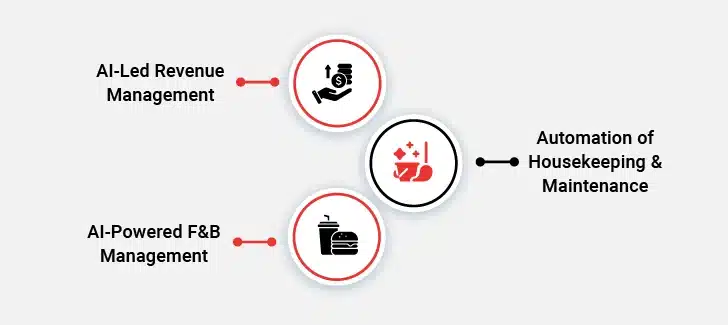
Even though, guest-facing AI initiatives are quite impressive, the true potential of AI in the hospitality industry is elsewhere. It lies in enhancing back-end operations, which then leads to saved costs and more profits.
I. AI Driven Revenue Management
Through constant rate adjustments based on competitor prices and market trends, AI is redefining revenue management. AI price adjustments in real-time work better than static models. They help in boosting guest occupancy and business profitability.
Revenue management systems like IDeaS and Duetto are predicting demands and offering price recommendations in real time. Using such systems, hotels can grow their revenue streams and remain competitive.
AI-powered systems also boost last-minute booking projections. It is done by designing on-the-spot, limited-time offers. Such offers increase occupancy and business margins.
II. Automation of Housekeeping and Maintenance
Advanced predictive approach is also increasing housekeeping efficiencies. AI in housekeeping eliminates the need for manual data analysis. Cleaning shifts can be organized more effectively by AI systems. They can review room occupancy status and guest check-out times. This way hotels can minimize staff expenses and allocate them elsewhere.
Hotel management gets valuable insights about possible equipment failures from predictive AI-based maintenance systems. These systems give advance warning about possible failures using sensors in hotel equipments. Clearly, this prevents sudden machine breakdowns and ensures guest comfort.
AI-based robots are now used in high-traffic areas for cleaning jobs with minimal human supervision. Big hotels such as Hilton are using AI robots like ‘Connie’ for housekeeping tasks and answering guest inquiries. This has saved worker times while offering unique guest experiences.
III. AI-Powered Food and Beverage Management
Food and Beverage (F&B) operations in many restaurants are benefitting from AI advancements. Innovations such as automated menu suggestions and demand forecasting and inventory control are getting popular.
AI-powered user apps can suggest meals based on guest preferences, dietary needs, and current eating trends.
Further, AI-based robots can now handle food preparation and food serving tasks. At restaurants like Boston’s Spyce, AI-powered robots are being used to prepare food. This has improved efficiency and speed. Other hotel brands are witnessing these benefits and planning to invest in AI programs.
McDonalds and certain other expensive food outlets are also using AI apps to offer drive-through options and room service orders. Interestingly they also suggest food items based on daily weather and time of the day for their customers. Guests and visitors are really liking these innovations and expecting them from other brands too.
Grow Your Business Productivity by 10X Using AI Agents.
How to Step Up AI Adoption in Hospitality
The range of AI applications in hospitality will only expand with growth in technology. But currently, it has only limited use cases and applications. AI-based sustainability projects, multilingual communications, and automated fraud detection systems are some of the popular applications.
To cut financial losses, certain hotels are using AI to detect and stop fraud reservations and payments.
Further, hotels are gaining from natural language processing (NLP) potential of AI. NLP-based AI removes language barriers, which enhances guest communication and service deliveries.
AI also enhances sustainability by reducing environmental damage and making energy management smarter. An AI-based sustainability solution automates resource management, reducing food waste and energy consumption. Using smart sensors, temperature levels can easily adjust to the number of guests. This reduces operating costs and carbon emissions.
As part of green initiatives, several hotels are experimenting with AI-powered recycling and waste-sorting technologies. But most hotels are currently using basic AI capabilities only. But this area shows great potential for future growth. The following advances are going to affect the next phase of AI in hospitality:
- Sentiment Analysis and Emotion AI: Social media posts and guest feedback forms are analyzed by AI tools to spot customer sentiment. Hotels can prevent various conflicts by analyzing the tonality of guests and common words used by them.
- AI-Powered Service Robots: It appears that hotels will slowly begin using service robots and digital assistants across major functions. These robots can do basic tasks such as in-room deliveries and luggage pickups. This will free up staff time to focus on 1-to-1 guest services.
- Voice-Based Hospitality Services: Hotel rooms already use Amazon’s voice AI called Alexa for many hospitality tasks. Guests can call housekeeping, adjust room settings, and order room service with simple voice commands. This zero-touch approach is expected to be adopted by all urban hotels. It will enhance both accessibility and convenience.
- AI for Sustainable Operations: As sustainability becomes more important, AI is helping hospitality businesses in reducing waste and energy consumption. Smart energy management systems powered by AI can automatically adjust lighting, heating, and cooling levels basis number of guests. That significantly limits both carbon footprints and operating costs.
Barriers and Concerns in the Adoption of AI
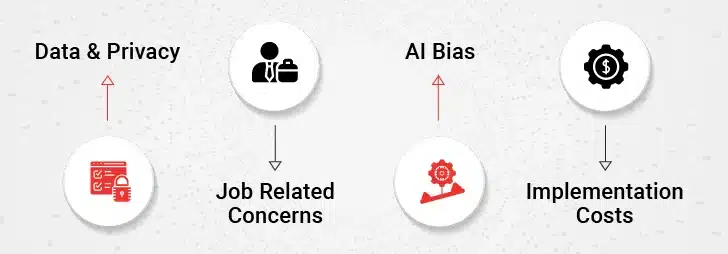
There are still challenges to overcome, although there is no denying the benefits of AI in hotel industry:
1. Data Privacy & Security
AI needs extensive guest data which generates two major concerns: data security and compliance with laws such as GDPR etc. The hotel industry is constantly facing cyber threats. This is due to storing sensitive customer information. Hotels require strong cybersecurity measures that comply with global standards to properly manage their guests’ data. They must build trust with guests by transparently showing how they handle and store data to prevent leaks.
2. Job Related Concerns
It is natural for employees to worry about layoffs due to AI adoption in hospitality industry. It is likely that automation could take away few jobs from humans. AI in hotel industry could end housekeeping and customer service roles. But it will also reduce human workload and boost total operational efficiency.
Newer jobs like AI system analysts and guest experience specialists are emerging in hospitality sector due to AI growth. To prepare for this change, hospitality professionals will need to enrol in training programs and gain the necessary skills.
3. AI Bias
Most data biases are responsible for biased outcomes since AI systems are only as accurate as the data they use for training. Sometimes, an AI system creates a negative outcome during daily interactions. This happens when it favors a guest from a specific race or region over the others. For example, AI-based prices may unintentionally discriminate against some weak income groups through dynamic price changes based on data patterns. This is why it is critical for hotels to ensure that the AI training data is diverse. This data should be regularly validated to remove biases that could prevent fair treatment of guests.
4. Implementation Costs
While smaller hotels can benefit from AI in terms of long-term cost savings, they find the initial investment very high. Higher initial investment and ongoing costs due to AI solutions cannot be avoided. But hotels can lose customers by ignoring chatbots, predictive maintenance, and revenue management systems.
In addition, there may be AI compatibility issues too with existing legacy systems of certain hotels. Hotels should assess the ROI from AI adoption before committing to it. They should choose only those solutions that can be started in phases to avoid high initial costs.
Through identifying internal challenges, hotels can effectively utilize AI’s potential without threatening jobs and customer trust.
Wrapping Up
AI in hospitality is not a distant dream. It is already shaping the hospitality industry. The hospitality sector will see more hotels providing better guest experiences, more productivity and profits through AI-led enhancements.
The hospitality industry’s AI-enabled future looks promising! More than 70% of executives stated the need to automate operations and over 50% of guests asked for AI-driven interactions. The hotel industry can now use AI to improve customer experiences and operations while staying ahead in a competitive marketplace.
Besides being a game-changer for guest satisfaction, sustainability, and personalization, AI is also an efficient tool. To stay ahead of competition, hospitality businesses must invest in AI programs. However, the successful deployment of AI in hospitality industry requires collaboration with an AI solutions provider.



